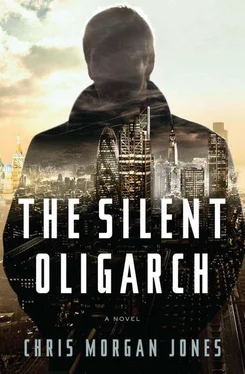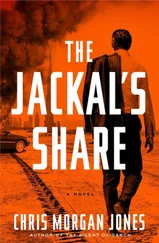“I’m not holding out on you, Skip. Really. I take the money offshore, bring it back again, and then make sure it’s invested where Konstantin wants it. That’s it. I may have been in Moscow for fifteen years but I’m not an honorary Russian. There’s a lot they don’t tell me.”
“OK.” Kesler thought for a moment. “Tell me this. If you wanted to prove that Malin was defrauding the Russian state, where would you look?”
“I wouldn’t begin to.”
“Of course not.” Kesler betrayed a touch of impatience, then collected himself. “Let me tell you why this is important. Tourna says that Faringdon exists only to process money. That you are a money-launderer. Now, to prove that, he needs to show—with evidence—that the money flowing through Faringdon is dirty. And there has to be a crime that creates the money in the first place—in the jargon, a predicate crime. Without it, all you have is something that looks like a money-laundering scheme, and that’s not enough. So if anyone is going to destroy Malin—or you for that matter—they have to show an offense. No way around it. So my question is: where is it? Where’s the crime?”
Lock felt his shoulders relax, and felt the urge to stretch. This was heartening. The crimes were deep in Russia, buried under layers of permafrost. If he didn’t know about them—and he really didn’t, not in any detail—then even the Americans would struggle to get close. How often had Moscow fallen to invading powers? Never, he was fairly sure. Not since the Mongols anyway. Russia was impregnable. The Ministry of Internal Affairs would never cooperate with the FBI, and no private investigation would get close. No crime was ever discovered in Russia unless someone more powerful than you wanted to hurt you, and Malin would have to fall badly out of favor to begin to be vulnerable.
“I don’t know,” he said, smiling at Kesler for the first time that week. “I think Tourna’s got his work cut out. He really has.”
FOR TWO HOURS on Saturday morning Lock was released to watch his daughter dance. He arrived early and waited outside in the cool morning light, ill at ease in the only casual clothes he had brought with him on this trip: tan corduroys, a pale-blue work shirt, heavy brown shoes. The church hall was some way north of Marina’s apartment in an area less refined, less pristine: it was a box of stained yellow brick set among older houses, its uniform walls segmented with long, narrow windows of frosted glass. Lock watched the mothers and fathers arriving with their children and wondered how many lived alone.
“Daddy!” Vika’s voice cut through the noise of traffic passing and he turned to see her running to him from the corner. As she reached him, he crouched a little to receive her hug and in one movement picked her up, his back stiff and weak. She was so much heavier than he expected, and the plumpness he remembered had given way to ribs and muscle. She was strong.
“Hello, rabbit.” He put her down and smiled at Marina as she walked toward them. “Morning.”
“Morning. How are you?”
“Daddy, are you going to stay and watch?”
“Of course. If I’m allowed.”
Vika pushed him playfully, as if he must be joking.
“Mummy, he can, can’t he?”
“I didn’t mean…” said Lock.
“It’s fine,” said Marina, smiling. “I know. We’ll watch from upstairs.”
Vika took Lock’s hand and led him into the hall. “Come on, Daddy.” Inside, parents were saying good-bye to their children or taking stairs up to a gallery that ran the length of the building. The walls were bare brick, the floor a scuffed parquet.
“Don’t you have to get changed?” said Lock.
“Into what?” said Vika.
“I don’t know. Dancing clothes.”
“These are my dancing clothes.” She was wearing sneakers, gray leggings and a grass-green T-shirt with a stylized oak tree on the front, its roots reaching down to the word “growth” printed in bold white letters.
“Come on,” said Marina, and with her hand on his arm guided Lock toward the stairs. “Have fun, darling.”
Vika ran into the hall, turning halfway to wave. Her hair was tied back in a ponytail, and Lock thought how much older she looked, how like her mother—her nose straight, her neck slight but strong. She was less like him now.
He and Marina sat on a bench in the gallery. He rested his forearms on the railing in front of him and looked down at Vika, who was in a cluster of children talking excitedly about their holidays and practicing moves: squatting on their haunches, striking poses. She was on the edge of the group, listening to the others interrupt each other in their need to get their stories out and waiting for her moment.
Marina put her hand on his forearm. “Thank you for coming. It’s nice to see you.”
“I should have been before.”
Marina didn’t reply; she was watching Vika below. After a moment she said, “She’s so pleased to see you.”
“I know. It’s a relief.”
“I’ve been careful not to blame you.”
Lock wanted to thank her but it didn’t feel appropriate. They were quiet for a while.
“What happened to ballet?” he asked.
“She does that on Wednesdays. But she loves this now. She practices all the time.”
“I bet she’s good.”
Marina smiled and looked down at the dancers. They had lined up, in two rows of ten, and were listening to their teacher, a woman of twenty or so who wore a baggy gray T-shirt and held herself in a way that was somehow set and sprung at the same time. The chattering had stopped and the children watched her closely as she walked back and forth. Vika’s face was grave with concentration.
“Good morning, everybody.” She had a teacher’s voice, ringing and clear. “Lovely to see you all looking so well. Let’s hope you’re feeling fit.” One or two of the children grinned, but Vika’s expression didn’t change. “I see we’ve got quite a few new faces, which is lovely. Welcome to St. Luke’s Dance. I’m Jennifer. What I think we’ll do is let the new dancers see what they’re going to be able to do. So everyone who was here last year, let’s have a go at our routine from the show. Let’s see what you can remember. We’ll be missing some dancers but just do your part and don’t worry too much.”
Lock watched Vika walk to the left of the group, bend fluidly down on one knee and crouch in a ball, her hands clasped over her head. Beside her, the other children shaped themselves carefully into their starting positions, some curled up like Vika, some in stars, some arching backward, their arms stretched to the corners of the room. At a nod from the teacher the hall filled with the thump of bass-heavy music. For four bars the dancers were still, almost uncannily so, until with great precision they broke into a syncopated rush of movement, spinning, leaping, kicking, arms and legs making intricate patterns in the air, some keeping better time than others. Each dancer had a style. Vika’s was serious but light, the intent in her eyes at odds with the easy grace of her steps, resembling her mother even in this. She was an inch taller than the others and despite her naturalness more stately, as if something from all those ballet lessons, something of Russia perhaps, would never leave her.
Lock felt tears starting to rise from his chest; he didn’t know why. He was not a sentimental man. When he was on his own in Moscow he missed Vika, but what he missed most plainly was practical: being with her, talking to her, teaching her things, hearing her laugh. What he realized now was that he had fallen behind in his idea of her. She was a different person now, different for being in London, different for being eight years old, different for dancing in this way that was so new and yet so fully her. Watching her move with the music, at once free and in command, he felt some small hint of terror at the thought that he might never really know her again. But the tears that he held in check were not for himself, and had nothing to do with sadness, or fear.
Читать дальше












